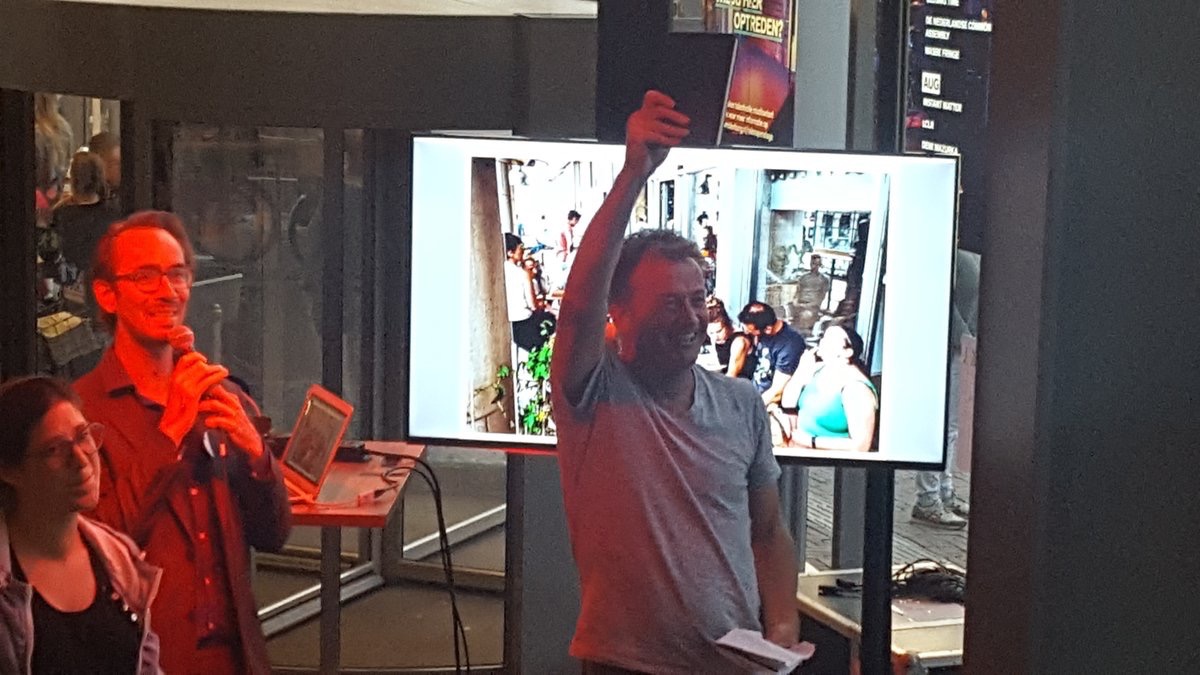My third and last blog in this series covers days 4 and 5 of the 16th IASC conference, held from 10 to 14 July in Utrecht. Thursday was a day unlike the others, because it was a day of field trips with destinations all over the Netherlands, instead of a regular conference day. While I wasn’t able to take part in the excursions, I did co-organize a side event on Thursday evening.
Thursday evening: launch of De Meent
That side event was the festive launch of De Meent, the Dutch ‘Commons Assembly’. Modelled as a national chapter of the European Commons Assembly, De Meent aims to connect and empower commoners of all walks of life. De Meent is “a platform for commons pioneers, thinkers and policy makers, and wants to advocate for commons-based principles in society at large.” The platform also intends to be a supporter for commoners, by lobbying, campaigning and offering expertise. The co-founders (including myself) conceived of it after the successful start of the European assembly in November 2016 and did a first feasibility check in two events in Pakhuis de Zwijger in spring 2017.
We had contributions by quite a number of commons(-like) practitioners. Pitches were made by Katuscha Sol of the Buurtcamping (neighbourhood camping) that has been replicating with the speed of light in the past couple of years; by Matthea de Jong on behalf of Leeuwarden (European) Cultural Capital 2018, aiming to include civil society in its realization as much as possible; by Sybrand Frietema De Vries, a social/civic multi-entrepreneur hailing from Friesland too; by Marleen Stikker, president of Waag Society (civil society institute for art, science and technology); and by Walter Dresscher, founder of The Natural City and curator of the Dutch P2P Foundation blog.
The high point of the evening was the presentation by Evi Swinnen on the work being done at TimeLab Gent, after which she handed over the lessons learned during the ‘Commons City Gent’ research (led by commons thinker Michel Bauwens) to Harm van den Heiligenberg. Harm is a civil servant of the Province of Utrecht, directs the province’s Transition Lab and corroborates this work as a PhD candidate. Harm in response shared the lessons he and his colleagues had learned in the past few years while preparing and running the Transition Lab. After some further discussion, we continued our lively talks at the bar of the venue we were so lucky to be made available to us for the evening: the open stage of Tivoli Vredenburg.
The scope of the commons
The general theme I picked up in Friday’s sessions and the conference’s closing event, was the assessment of the present-day potential of the ‘commons’ notion. Overall, the attendees suggested to anticipate a further growth of interest in the commons and a widening of its conceptual and practical applicability.
In the morning, I attended a panel dealing with theoretical approaches in commons studies, with presentations on the dynamics surrounding the ‘global land rush’, the fate of rural/forest commons in post-communist Romania (see also my post on Day 1) and the multi-level negotiations taking place in the growth of ‘slow paths’ (natural walking ways) in Flanders. What struck me, was Elinor Ostrom’s clear triumph in shaping commons theory – with the influence of the likes of Karl Polanyi following at considerable distance. With Ostrom’s analytical basis in rational choice theory, we conceive of a world working towards solutions, sometimes succeeding, sometimes failing. Polanyi’s world, however, is one of power differentials and historical contingencies. Polanyi, moreover, pays greater attention to the deeply social underpinnings of what we call ‘the economy’. We certainly cannot deny Elinor Ostrom a sense for our social capabilities for cooperation, but in her work she chose for a rather detached, formalizing approach, with trust and information as main currencies, not power or interests. I think commons scholarship may benefit if we increase the number of conversations between those modes of analysis.
In another session, the commons lens – again mainly Ostromian – was applied to issues of global biodiversity. One researcher reporting from the failed Yasuni-ITT programme (to conserve Ecuadorian rainforest by not drilling for oil) concluded that in the end, the failure to make international arrangements to conserve this ‘global common’ stems from psychocultural (or rather: ‘cosmological’) differences between local, indigenous dwellers and rationalist conservationists from the Ecuador government and international agencies. This clearly hints at the necessity to bridge the worldviews held by different stakeholders implied in the communal land and conservation nexus. A better understanding of the cultural motives and means to preserve their common may help conservation and development institutions from the North to be more forthcoming and inclusive in their strategies.
To sum up, the 16th IASC conference saw a large variety of issues and perspectives; but pointed above all to the work still needing to be done before (in a theoretical sense) the commons, or ‘common property regimes’, or ‘collective action institutions’ or any other sibling notion, is strong enough to really cope with present-day societal questions. But the things said and done by the conference’s participants clearly suggested the intention and ardour to do so. To which I hope to contribute in the next couple of years.
The next (17th) IASC biennale will take place in Lima, Peru in 2019.
Navigate to earlier posts via the (arrowed) links below.
